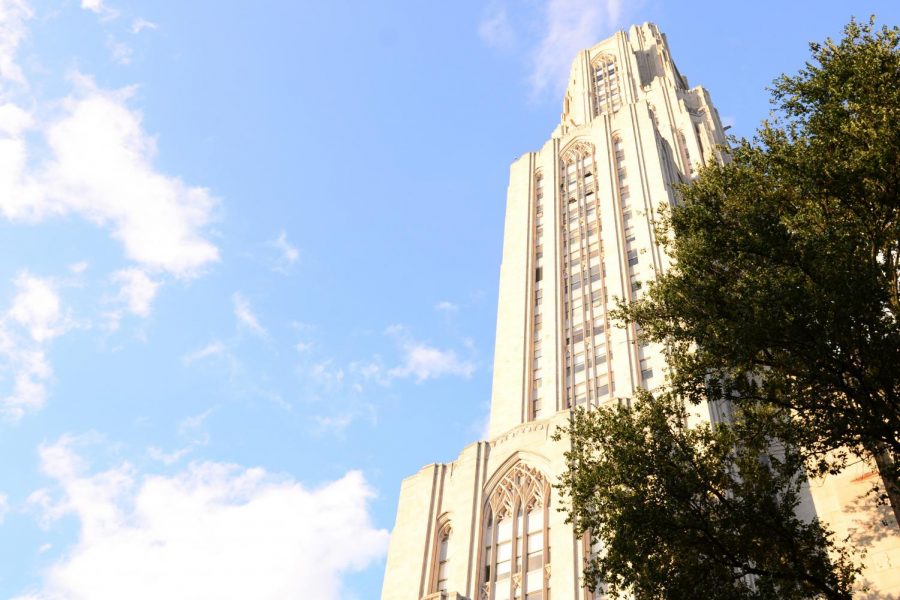Pitt hosts eco-friendly events to celebrate Earth Day, encourages sustainability
Wu Caiyi | Senior Staff Photographer
Pitt’s Office of Sustainability provided a list of COVID-safe ways to celebrate Earth Day this year — such as guided hikes and park cleanups — with different community organizations, while also providing educational resources so people can both celebrate and learn.
April 23, 2021
With Pittsburgh’s recent shifting temperature from sunny, 65-degree days to snowy, 30-degree days — a type of mild “weather whiplash” due to climate change — Pitt students have been itching to get outside and take a break from online school and finals. Even with these odd weather patterns, Alexander Johnson said he wants to take this Earth Day to spend time outside.
“My biggest goal is just to spend some time out in nature with some close friends,” Johnson, a senior environmental studies and communications double major, said. “This has been a hard year, and Earth Day is a great excuse just to get outside and take a break from sitting in your house working from home or studying all the time.”
Pitt’s Earth Day events in the past included service events, litter pickups, educational events and informational fairs. The Office of Sustainability provided a list of COVID-safe ways to celebrate Earth Day this year — such as guided hikes and park cleanups — with different community organizations, while also providing educational resources so people can both celebrate and learn.
One of these events — hosted by the Mascaro Center for Sustainable Innovation on April 13 — the “Leveraging Research to Inform Calls to Action” Earth Month Teach-In featured seven women from campus and the community to discuss their research in areas of environment, equality and economics, according to to the teach-in’s web page.
Additionally, the 14th annual Pitt Sustainability Symposium will take place this Friday and virtually showcase student sustainability projects at Pitt, as well as feature keynote speaker Jerry Dickinson, an associate professor in Pitt’s School of Law.
The 25 Pitt Sustainability Champions — which are students, faculty and staff who embody leadership and a commitment to sustainability — will be officially recognized at this event.
Aurora Sharrard, Pitt’s sustainability director, said her office awarded a larger number of individuals this year than in the past due to the challenges that COVID-19 presented.
“For the Pitt sustainability awards, we generally award a small set of individuals and announce them at the sustainability symposium,” Sharrard said. “We selected a larger number this year due to COVID and people being remote and having to do things a little bit differently.”
Danielle Andrews-Brown, lecturer and Environmental Studies Program coordinator, said the purpose of Earth Day is “about the broadening of education” about environmental topics, especially due to issues such as climate change and the COVID-19 pandemic.
“This effort is of utmost importance as we face global challenges such as climate change, environmental degradation, COVID-19,” Andrews-Brown said. “We are all responsible for the health of our environment and ourselves and we have a duty to be part of the solution to restore and/or preserve.”
Environmental teach-ins date back to the first Earth Day in 1970, when students from Pitt, Carnegie Mellon and Duquesne universities all hosted an teach-in to educate the community about environmental issues, according to Sharrard. She said providing more educational resources and events this year has been important and reminds her of “the original Earth Day,” which also focused on educational resources.
“It’s almost like the original Earth Day,” Sharrard said. “We’re really trying to educate people about the importance of the environment.”
Some of the other events on the Office of Sustainability’s website are coordinated by organizations such as Allegheny County Parks or the Pittsburgh Parks Conservancy. These events include Allegheny County Park’s cleanup with park rangers on this Saturday at 10 a.m. and the Pittsburgh Parks Conservancy’s guided hike in Duquesne Heights this Saturday at noon and mushroom walk on Sunday at 10 a.m.
Iliana DiNicola, senior environmental studies major, said she has been helping the Pittsburgh Parks Conservancy with COVID-19-safe Earth Day activities this year.
“Previously, I’ve mostly done trash and litter pick-ups, alongside just getting some fresh air,” DiNicola said. “This year I’m doing something more interesting. I’ll be helping Pittsburgh Parks Conservancy with some socially distanced outdoor activities, such as kite making and yoga.”
Johnson said he also volunteered with Pittsburgh Park Conservancy in the past, which he enjoyed because he could spend time outside while also helping the community.
“In the past, I’ve volunteered with organizations like the Pittsburgh Park Conservancy to remove invasive plants, pick up trash and clear trails,” Johnson said. “It’s always nice to spend a couple hours doing something useful with a local organization.
Students can also celebrate Earth Day this month through practicing sustainability. Clutter for a Cause — which happens annually during student move-in and move-out — allows students to drop off donatable, reusable and recyclable items at various locations until April 30.
Drop-off times at the different locations vary, but students can drop items off at select times at locations such as Schenley Quad or Litchfield Towers patio. According to Sharrard, all items collected through Clutter for a Cause are either resold by the University of Thriftsburgh — the on-campus thrift store — or resold or recycled by Pitt Surplus.
Samantha Ford, sustainability projects coordinator in the Office of Sustainability, said donating items to Clutter for Cause is a good way to practice sustainability this month.
“I think Clutter for a Cause is a great way to celebrate Earth Day,” Ford said. “Donating these items helps divert stuff from landfills.”
With finals coming up, it may be hard for students to fit extra sustainable practices into their routine, but according to DiNicola, celebrating Earth Day and practicing sustainability does not have to include any drastic measures.
“Celebrating Earth Day can be quite simple actually. I suggest people begin challenging their everyday routines and customs for those that are more environmentally friendly, but also within your budget,” DiNicola said. “For example, I try to avoid buying produce that isn’t local to Pittsburgh, walk or take the bus as much as possible, be conscious of my water consumption, and loads of other small but meaningful changes.”
Johnson also said starting small is the best way to incorporate sustainable practices into daily routines.
“Some small steps that have big impacts could be choosing a day or two a week to eat vegetarian or swapping out some disposable items for a reusable option,” Johnson said. “Starting small is a good way to get in the habit of thinking about sustainability every day.”



